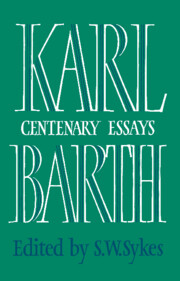Book contents
- Frontmatter
- Contents
- Note on the text
- 1 Introduction
- 2 Karl Barth's eschatological realism
- 3 The triune God and the freedom of the creature
- 4 Authority and openness in the Church
- 5 Ad Limina Apostolorum in retrospect: the reaction of Karl Barth to Vatican II
- 6 The reception of the theology of Karl Barth in the Anglo-Saxon world: history, typology and prospect
5 - Ad Limina Apostolorum in retrospect: the reaction of Karl Barth to Vatican II
Published online by Cambridge University Press: 26 February 2010
- Frontmatter
- Contents
- Note on the text
- 1 Introduction
- 2 Karl Barth's eschatological realism
- 3 The triune God and the freedom of the creature
- 4 Authority and openness in the Church
- 5 Ad Limina Apostolorum in retrospect: the reaction of Karl Barth to Vatican II
- 6 The reception of the theology of Karl Barth in the Anglo-Saxon world: history, typology and prospect
Summary
The centenary of the birth of Karl Barth has coincided with the twentieth anniversary of his ecumenically significant visit to Rome in September 1966; already an ailing octogenarian, Barth wistfully caricatured his trip as a peregrinatio ad limina apostolorum, as an official call on Pope Paul VI undertaken by a separated brother and elder. Equipped with one general set of questions and nine double sets – questions for clarification and critical questions – derived from nine of the sixteen Latin documents of Vatican II (1962-5), Barth arrived post festum at the centre of Roman Catholicism, so as ‘to become acquainted with its theology where it had long been operating, and from where, with conflicting and interrelated tendencies, it had now adopted for itself new standards and directions’. In the subsequently published booklet, with the same playfully earnest title as the visit itself, Barth provided no more than a brief description of the felicitous happenings in Rome, and an unedited facsimile of the theological questions he openly discussed there with leading representatives of Catholicism. In explaining the reason for his brevity, Barth parenthetically mentioned that some of his queries were left unanswered: ‘Because from the beginning I assured the Secretariat for Unity of my strict discretion, the reader will find here nothing of the answers (sometimes, lack of answers) which my questions received in Rome.’ Yet, despite the silence Barth maintained, and the less than total satisfaction he hinted at, he voiced two reactions to his historic ‘working pilgrimage’ which indicated its generally successful outcome in his eyes.
- Type
- Chapter
- Information
- Karl BarthCentenary Essays, pp. 87 - 114Publisher: Cambridge University PressPrint publication year: 1989



